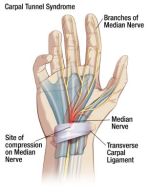- Home
- Diagnosing CTS
- Lab Tests and Xrays for Carpal Tunnel Syndrome
Lab tests and xrays for
Carpal tunnel syndrome?
A lot of my patients ask me about lab tests and xrays for carpal tunnel syndrome. The truth is, there's really not any specific lab tests or blood work that you can get to diagnose carpal tunnel syndrome (CTS).
And unless you have some kind of bone abnormality in your wrist...either from an ACUTE WRIST INJURY OR WRIST FRACTURE or some type of advanced case of ARTHRITIS Xrays are of limited value.
Xrays are really to diagnose problems with bones...and carpal tunnel syndrome involves mainly a nerve, a ligament and some tendons...See Anatomy of Carpal tunnel syndrome ..and those things just don't show up on an xray real well (other than as faint shadows).
Now, that's not to say there are no tests that can be ordered when trying to diagnose CTS. TWO of the BEST "tests" or studies that can be ordered are called electrodiagnostic tests, pronounced
(Elect-trow-DIE-ag-noss-tick).
One TYPE of electrodiagnostic test is called a
NERVE CONDUCTION TEST or STUDY (NCS)
The other TYPE is called an Electromyogram test, pronounced
(Elect-trow-MY-O-gram) or
EMG TEST for short!!
However, as we have talked about in carpal tunnel syndrome causes, there may be some Lab tests and xrays for carpal tunnel syndrome in where some of the possible causes can be ruled-out or help exclude the presence of another type of medical condition or a disease, that may be predisposing you to carpal tunnel syndrome.
What type of lab tests depends on several things...mainly what are you trying to rule-out. It also can depend on your age and what kind of symptoms you are having. Lab tests can help diagnose things like diabetes, hypothyroidism, etc....which can bring on CTS.
An important clue is that MOST systemic diseases (pronounced Siss-tim-ick)...That is, Diseases that affect the whole body, are associated with bilateral carpal tunnel syndrome (i.e. symptoms in BOTH hands). In comparison with carpal tunnel symptoms in one hand that you may see in over-use type of injuries (may be your dominant hand or the one that you use more repetitively).
Xrays
As I said before Xrays are of little value and typically not ordered initially unless there is a history of trauma (i.e. car wreck or fall) or a physical finding that would indicate abnormal bone formation (i.e. Rheumatoid arthritis).
Imaging studies
Imaging studies such as ultrasound and MRI's may have some value, but are not very practical unless you are near a hospital or center that does them on a regular basis.
Ultrasound has been shown to be useful in some settings to detect swelling in the carpal tunnel. It also has been used in limited capacity (using High-resolution ultrasound) to asses median nerve swelling.
However, as I said before, these kind of imaging studies are typically done at research type hospitals or teaching hospitals and are not very practical in the "real world".
Magnetic resonance imaging (MRI) Is sometimes helpful if a lesion or mass is suspected within the carpal tunnel canal, thus crowding or putting pressure on the median nerve. But again, MRI's are rarely indicated in every day practice. They may be used, I suppose, if you have a patient who has failed conservative treatment and/or abnormal carpal tunnel anatomy is suspected.
Summary
Since carpal tunnel syndrome is a condition mainly involving a nerve and a ligament (known as soft tissues) and not bone, xrays are of limited value.
Lab tests are better at excluding or ruling-out conditions that predispose you to carpal tunnel symptoms, rather than actually diagnosing CTS itself.
Carpal Tunnel Syndrome Causes
CTS Explanation
EMG TEST for carpal tunnel syndrome
NCS for carpal tunnel syndrome
ABNORMAL NCS for carpal tunnel syndrome
- Home
- Diagnosing CTS
- Lab Tests and Xrays for Carpal Tunnel Syndrome
Share this page:
Recent Articles
-
The carpal tunnel store
The carpal tunnel store has a huge selection of Medical Grade Products -
Anatomy of the carpal tunnel
The carpal tunnel anatomy is easy to understand if you remember we're dealing with a tunnel of sorts in your wrist. Learn the anatomy from a medical practitioner. -
Carpal tunnel prevention program
A carpal tunnel prevention program at the workplace may help employees from getting symptoms. Learn the best carpal tunnel prevention program on the web today.
Recent Articles
-
The carpal tunnel store
The carpal tunnel store has a huge selection of Medical Grade Products -
Anatomy of the carpal tunnel
The carpal tunnel anatomy is easy to understand if you remember we're dealing with a tunnel of sorts in your wrist. Learn the anatomy from a medical practitioner. -
Carpal tunnel prevention program
A carpal tunnel prevention program at the workplace may help employees from getting symptoms. Learn the best carpal tunnel prevention program on the web today.
